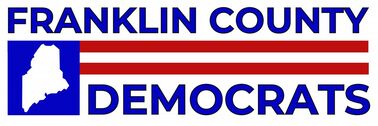The Maine Democratic Party (MDP)
is actually several organizations, ranging from the Democratic State Committee to the state convention to county and municipal parties.
is actually several organizations, ranging from the Democratic State Committee to the state convention to county and municipal parties.
- The Democratic State Committee makes policy decisions, adopts rules, elects leaders and members to other committees.
- It is largely made up of delegates and chairs from the counties, but also includes party officers and committee chairs.
- County parties are made up of members elected from their municipalities, but most also allow individual members to join.
- They elect officers, help their candidates, and fill posts allotted to by the DSC and the state convention.
- They elect officers, help their candidates, and fill posts allotted to by the DSC and the state convention.
- The municipal committees meet on Municipal Caucus Day to elect delegates to the state convention and to their county party.
- Some organize and remain active, and others join with other municipalities to share officers. Those are called regional committees.
- The DSC Executive Committee makes recommendations to the DSC, and acts in the DSC’s place when necessary.
- It is largely made up of officers, members elected by the DSC, and representatives of affiliated party organizations.
- The Rules Committee gives advice and recommendations on changes to the MDP Charter and DSC Bylaws.
- It is made up of members elected by the county parties.
- It is made up of members elected by the county parties.
- The Diversity, Equity, and Inclusion Committee works to diversify our party and to install a “sense of belonging” to new Democrats seeking to be involved.
- It is a new committee, and is still working on details of how it will organize.
- It is a new committee, and is still working on details of how it will organize.
- The Grievance Committee considers disputes between party organizations and/or members. DSC members must petition the committee to hear cases.
- Members are elected by the DSC.
- Members are elected by the DSC.
- The Finance Committee reviews and gives advice on the MDP’s financial status.
- Members are elected by the DSC.
- Members are elected by the DSC.
- The Platform Committee makes recommendations for the MDP Platform at the state convention.
- Members are elected by the county parties.
- It only exists during the platform process.
- Members are elected by the county parties.
- The Credentials Committee makes decisions and issues a report on the county delegations to the state convention.
- Members are elected by the county parties.
- It only exists during the state convention process.
- Municipal Caucus Day is the day set by the MDP to elect delegates to the state convention and delegates to their county party, and to elect officers.
- Regional committees may hold caucuses as well.
- The State Convention is held in the spring of an election year to establish a platform, adopt changes in the MDP Charter, and for county delegates to elect DSC delegates.
- It also elects national convention delegates in presidential election years and members of the Democratic National Committee.
- The Coordinated Campaign is a consortium, managed by the MDP and made up of candidates and campaign committees to coordinate voter turnout for each general election. Examples from last election would be the Mills campaign, and the Maine State Senate Democratic Campaign Committee.
- The MDP facilitates the Coordinated Campaign, but decisions are made collectively.
- The MDP facilitates the Coordinated Campaign, but decisions are made collectively.
- The MDP staff implements approved policies, handles the day-to-day business, maintains infrastructure, and operates the elections efforts.
- The MDP Chair (a volunteer position) directs the Executive Director (a paid staff position), and the ED directs the unionized staff, which includes people responsible for communications, fund raising, financial reporting, party records, and campaigns.
- The MDP Charter is akin to a constitution, authorizing actions at all levels of the MDP.
- It is approved by the state convention.
- DSC amendments to the Charter must be ratified at the state convention.
- It is approved by the state convention.
- The DSC Bylaws are the rules governing the DSC, based in part on what is allowed in the Charter.
- DSC members vote on bylaw changes.
- County committees and municipal/regional committees also have bylaws.
- Maine state law also governs, in part, what the state and municipal parties do.
- There is very little in Maine state law regarding county parties.
- There is very little in Maine state law regarding county parties.

